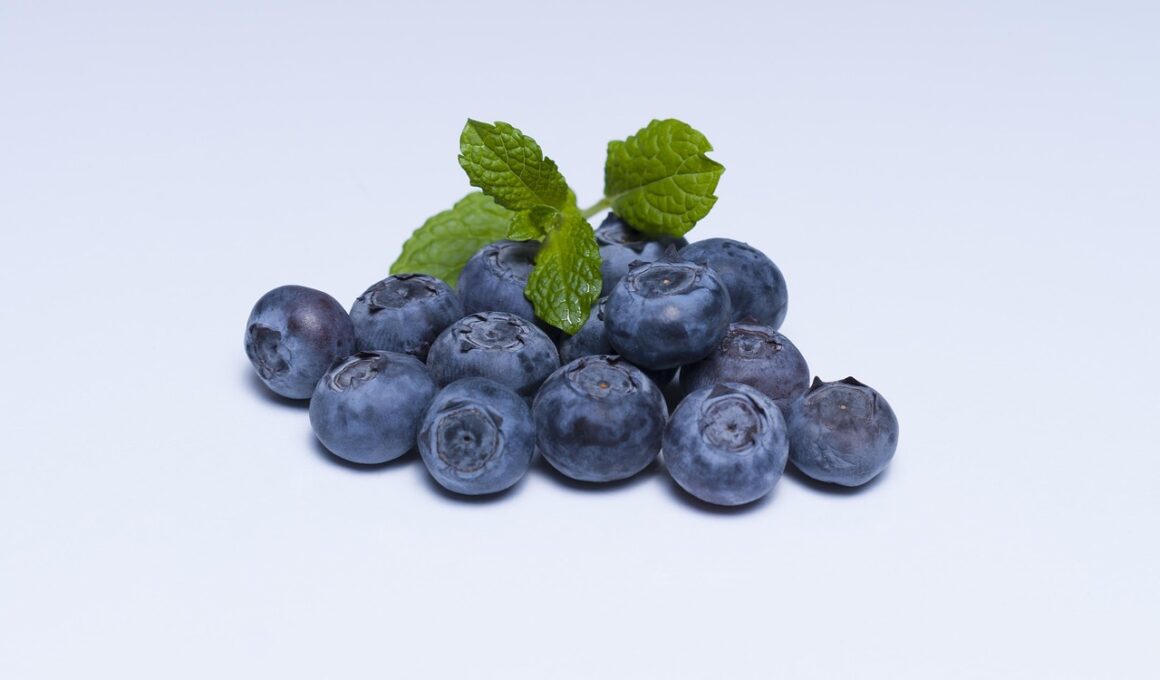Superfoods That Help Reduce Inflammation Naturally
Inflammation plays a significant role in many chronic diseases, making it crucial to manage effectively. Several superfoods have demonstrated promising potential in reducing inflammation naturally, offering a delicious solution to those seeking healthier lifestyles. Incorporating these nutrient-dense foods into daily diets can yield great benefits. For instance, blueberries are packed with antioxidants called flavonoids, which may inhibit cellular inflammation. Including blueberries in smoothies or as a snack is a tasty way to enjoy their benefits. Turmeric is another popular superfood; its active compound, curcumin, boasts potent anti-inflammatory properties. A golden milk latte or curry dish can incorporate this spice effectively. Greens: Leafy greens such as kale and spinach are high in vitamins and phytochemicals, contributing to reduced inflammation. Lastly, fatty fish like salmon provide omega-3 fatty acids that can decrease inflammatory markers. A breakfast bowl with oats, fish, and greens paints the perfect picture for a health-focused meal! Relying on these superfoods not only enhances nutrition but also aids in maintaining overall wellness by fostering a balanced diet. Consistency is key when integrating these foods for optimizing health benefits.
Many people look for natural ways to alleviate inflammation without relying on pharmaceuticals, and superfoods can play an essential role in this journey. Ginger, for instance, has been revered for its anti-inflammatory effects for centuries. Adding ginger to tea or stir-fried meals delights the palate while providing identified benefits. Cherries are another powerful fruit; consuming tart cherries has shown remarkable effects on lowering uric acid levels, a common cause of severe inflammation. Including cherries in your dessert, smoothie, or snack will contribute to managing inflammation. Broccoli, a cruciferous vegetable, is also beneficial due to sulforaphane—an antioxidant that prevents inflammation at the cellular level. Integration of broccoli into meals can be easy and versatile, as it can be eaten raw, steamed, or roasted. Also, cinnamon is a delightful spice rich in antioxidants. Adding it to coffee or oatmeal brings taste and inflammation-reducing properties to the table. As individuals explore these superfoods, they will likely experience not only reduced inflammation but also improved overall health, reaffirming the value of nature’s pantry.
Herbs and Spices That Combat Inflammation
In the realm of superfoods, herbs and spices hold an esteemed place, given their remarkable ability to combat inflammation. Rosemary, for example, contains rosmarinic acid, known for its anti-inflammatory properties. Seasoning grilled chicken or roasted potatoes with rosemary enriches both flavor and health benefits. Similarly, garlic is a versatile ingredient that possesses anti-inflammatory abilities due to its high concentration of sulfur compounds. Incorporating raw garlic into salad dressings or sauces encapsulates its benefits while enhancing taste. Moreover, oregano is packed with antioxidants. It can be added to pasta dishes and pizza to not only deliver a flavorful punch but also to work against inflammation. Cloves are another powerful example, showing promise in reducing pain and inflammation. They can be used in desserts or infused in hot beverages. When people strive to incorporate various herbs and spices into their diets, they may discover an enjoyable way to manage inflammation while still indulging in rich flavors that enhance their meals.
Not to be overlooked, there are also seeds that provide tremendous health benefits concerning inflammation reduction. For example, flaxseeds are rich in omega-3 fatty acids and antioxidants, making them a powerful addition to a diet aimed at reducing inflammation. Many individuals enjoy sprinkling flaxseed on yogurt, cereal, or in smoothies for an easy health boost. Chia seeds also rank highly on the anti-inflammatory scale, providing a mix of omega-3 fatty acids, fiber, and protein, aiding in digestion while combating inflammation. Chia seeds are excellent in puddings, as toppings, or incorporated in baked goods. Additionally, hemp seeds provide a complete protein profile and healthy fats, contributing to an anti-inflammatory diet. Incorporating these seeds into daily meals provides a nutritional arsenal against inflammation. Experimenting with various recipes allows individuals to enjoy the myriad health benefits while enhancing their culinary experiences. Whether making bread, salads, or smoothies, these seeds bring exciting flavors and textures, ensuring that people develop a positive and ongoing relationship with plant-based nutrition.
Satisfying Snacks to Reduce Inflammation
In the fast-paced world we live in, having quick, satisfying snacks that also help reduce inflammation can be a real game changer. Trail mix made with nuts, seeds, and dried fruits can be a superfood powerhouse. Almonds and walnuts, often included, are rich in healthy fats and antioxidants. When these are combined with dried cranberries or goji berries, one gets a delightful blend of sweetness and health benefits. Hummus is another fantastic snack option; it combines chickpeas, which are rich in fiber and protein, with olive oil, a source of healthy fats. Enjoying hummus with an array of vegetables creates a fun and healthy snack platter. Additionally, dark chocolate, especially varieties above 70% cocoa, has shown potential advantages against inflammation due to its high antioxidant content. Indulging in a couple of squares of dark chocolate, combined with some fresh berries, makes for an enjoyable treat. As people explore various options for nutritious snacks, they can easily find ways to incorporate superfoods without sacrificing taste or enjoyment, ultimately leading to a healthier lifestyle.
To maintain a balanced diet, healthy fats are critical, as certain fats can help decrease inflammation. Avocados are rich in monounsaturated fats, contributing to overall heart health while fighting inflammation. They can be used in salads, smoothies, or as a creamy spread on toast. Another healthy fat source is extra virgin olive oil, widely regarded as a cornerstone of the Mediterranean diet. This oil not only enhances flavor but is rich in antioxidants and healthy fats, reducing inflammatory markers in the body. Incorporating olive oil in salad dressings or as a finishing drizzle on cooked vegetables is an easy approach to enjoy its benefits. Nuts, particularly walnuts, provide omega-3 fatty acids and fiber, contributing to improved health outcomes by reducing inflammation. Nuts can be included in various meals, enhancing both texture and nutrition. Eating a variety of healthy fats in meals complements a well-rounded diet, promoting health while making flavorful food choices. Listening to the body’s needs can guide nutrition choices while seeking integrated pathways to prevent chronic inflammation.
Combining Superfoods for Optimal Benefits
Combining various superfoods can yield synergistic effects, amplifying the potential benefits they provide to reduce inflammation naturally. A delicious smoothie made with spinach, avocado, and a handful of berries can create a nutrient-dense drink packed with antioxidants. Mixing chia seeds into the blend not only adds fiber but also enhances the overall nutrition profile. Another great combination includes adding turmeric to soups or sauces alongside ginger; this duo makes for a savory and aromatic dish that also enhances anti-inflammatory benefits. When individuals create salads, incorporating leafy greens, seeds, nuts, and drizzling olive oil as dressing creates a complete meal that caters to both taste and health. Superfoods can also be creatively incorporated into baked goods, where flaxseed or chia seed can replace eggs, providing both nutrition and binding properties. Exploring various combinations allows individuals to diversify their meals while optimizing benefits. Embracing variety also contributes to maintaining interest in one’s diet, helping ensure continued commitment to health and wellness. Building meals with an emphasis on integrating superfoods can lead to better health outcomes and foster an enjoyable cooking experience.
In summary, adopting superfoods that help reduce inflammation naturally can significantly improve overall health and wellness. From fruits to herbs and spices, incorporating these versatile foods into daily routines offers numerous benefits. Emphasizing a whole foods approach coupled with mindful eating can ultimately pave the way to healthier habits, which are essential in preventing chronic conditions linked to inflammation. Those embarking on a journey to better health can find joy in trying new recipes and experimenting with different combinations. The beautiful colors and diverse flavors bring excitement to the journey towards a healthier diet. Individuals should aim to create sustainable meals that are enjoyable and fulfilling. Building a personal relationship with food can change perspectives, emphasizing food as an ally in managing inflammation rather than merely sustenance. As families get together and share meals, the bonding experiences help in growing a collective appreciation of nutrition while fostering healthier relationships. Adopting these practices with the inclusion of superfoods can bridge gaps in nutrition, leading to improved outcomes in everyday health and vitality, brightening the personal health journey.


